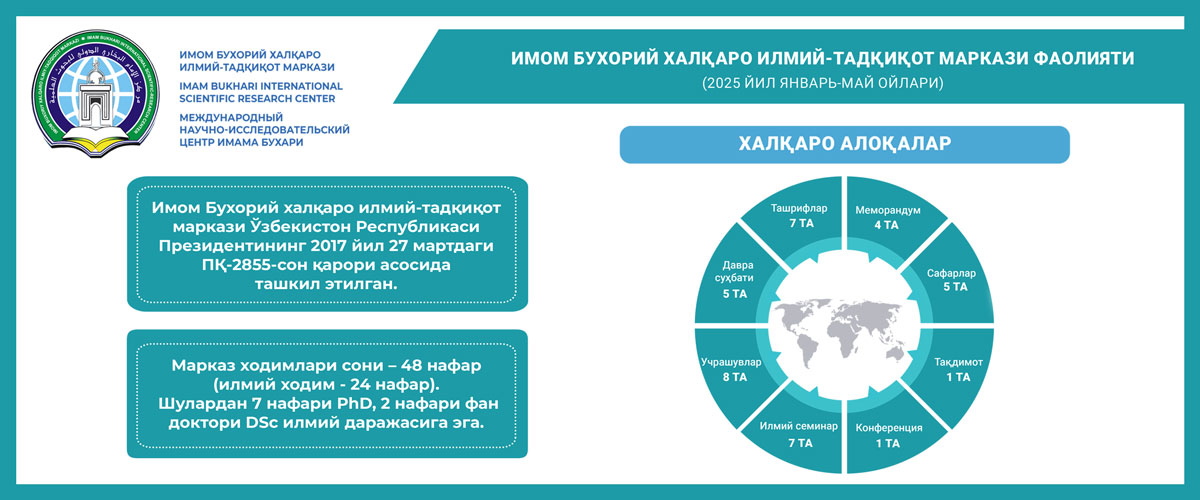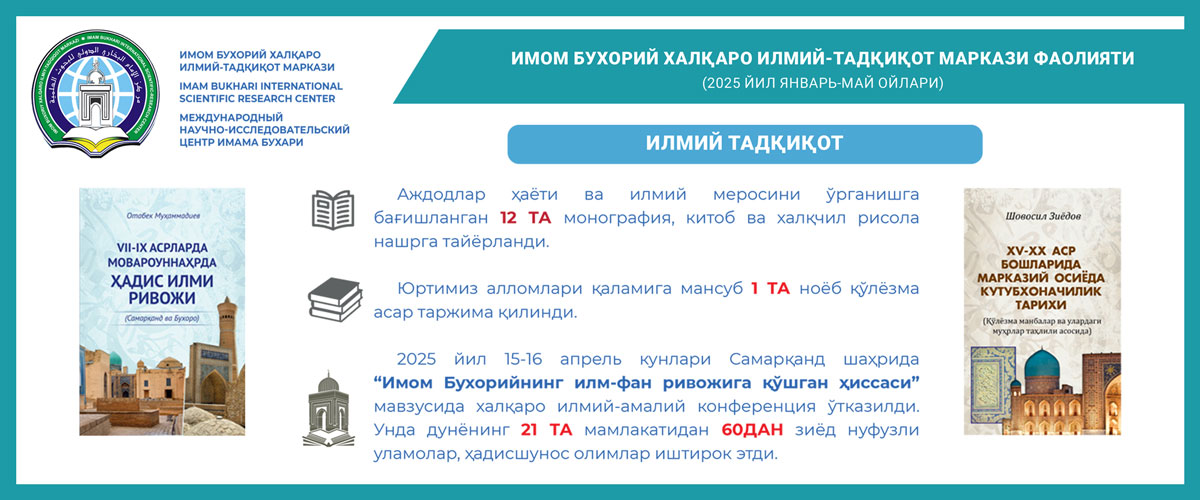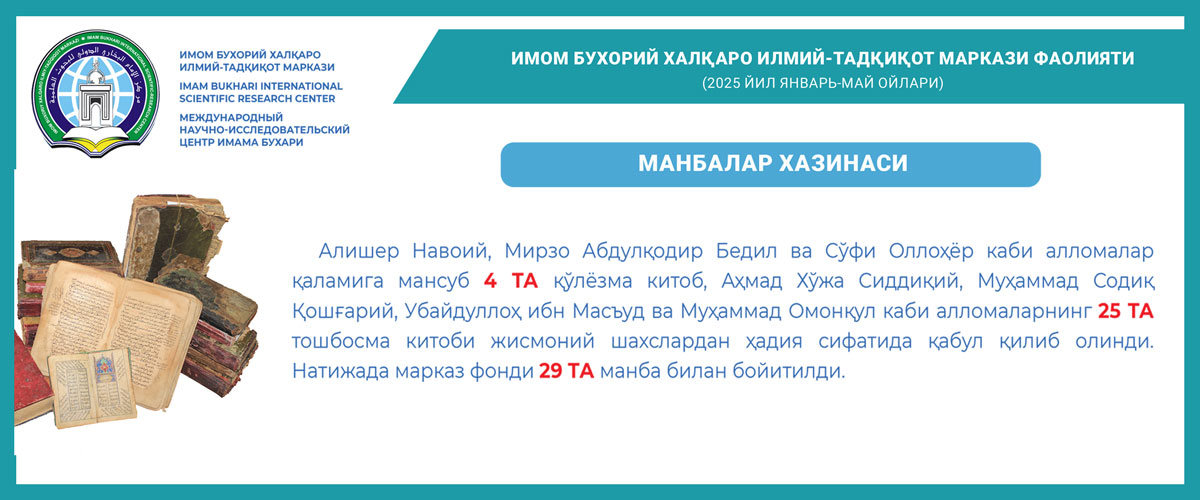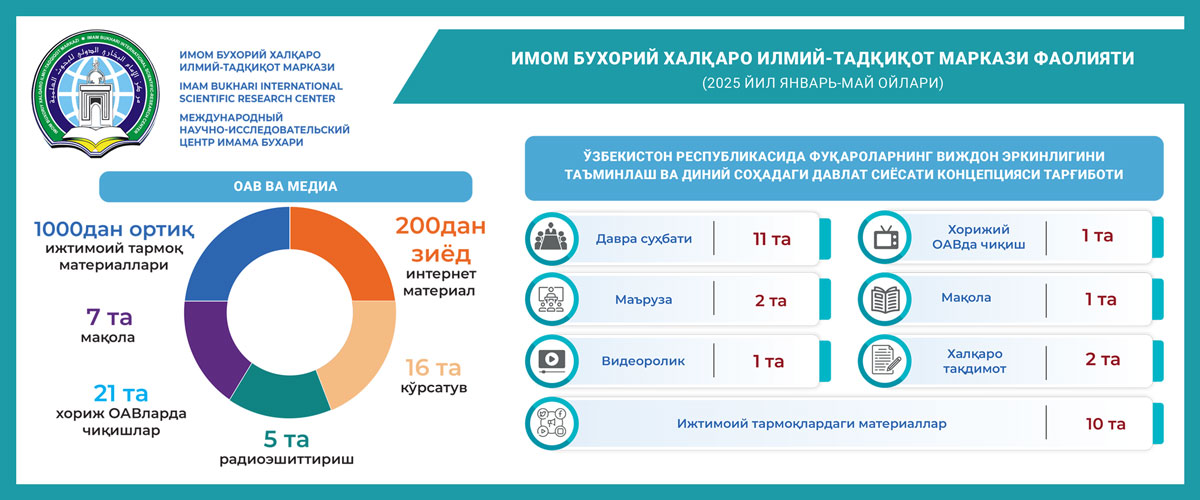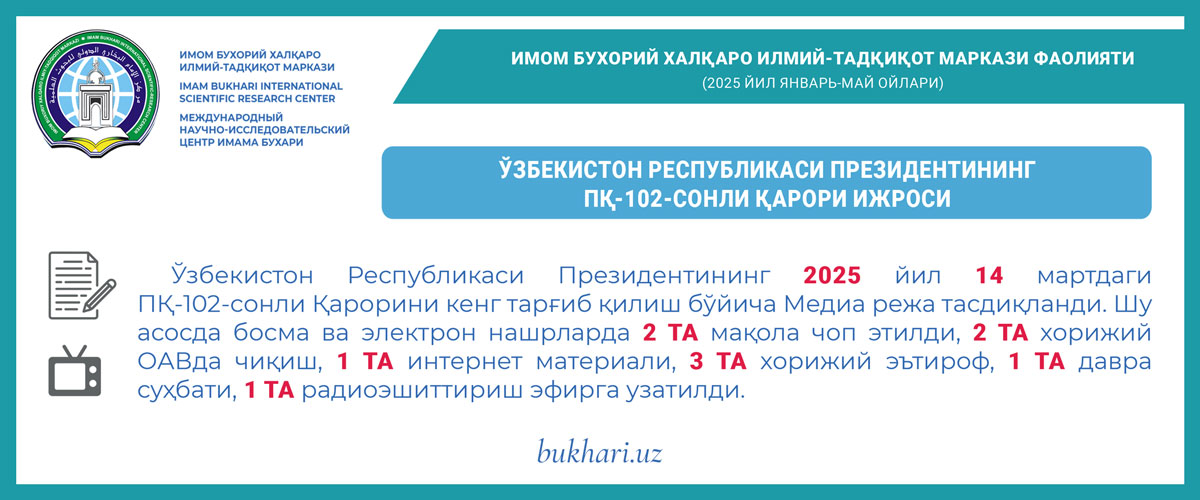Makhdumi A’zam played an important role in the spiritual development of Zahiriddin Muhammad Babur. He used to send letters and presents to his spiritual leader. As an answer to these letters, Makhdumi A’zam wrote a monographic research work titled as “Risalai Baburiya”.
Makhdumi A’ zam had great authority and honour in Eastern Turkistan as well. As the sources inform us, after occupying the throne of Yarkent, Abdurashid Khan (1533-1560) sent a messenger to Makhdumi A’zam, called him to Yarkent as a guest and asked him to stay there to perform the duties of a “pir” for the devout Muslims.
On his visit to Yarkent, Makhdumi A’zam took Muhammad Sharif, who was one of his devoted disciples. Having explained his reasons that he could not stay in Yarkent, Makhdumi A’zam left his disciple and follower Muhammad Sharif as a pir for Abdurashid Khan. Later his son Khoja Is’haq Vali, born from his last wife Bibichai Qashghari, came to Turkistan, helped to the spiritual development of this country and served as a great fighter against invaders.
The written sources inform us about the students and followers of Makhdumi A’zam. Some of them say that Makhdumi A’zam educated more than 60 saints and became “piri murshid” of “piri shasti”. At the end of his life,the number of his disciples reached 70 and their leader was a man from Chust Mavlana Lutfullah. After the death of Makhdumi A’zam, he became the spiritual leader of the Naqshbandiya order in the area and showed a great support to the activities of Khoja Is’haq Vali in his spiritual and secular activities. When he died, he was buried in Chust.
Makhdumi A’zam’s another disciple Khoja Islami Juybari was born in 1494 and at the age of 12 he became a devout disciple of Makhdumi A’zam. After the death of his master, Juybari educated his teacher’s elder son Khojai Kalan — Muhammad Amin and, at the same time, he used to serve as a spiritual leader for most of the rulers.
Another disciple of Makhdumi A’zam was Mavlana Payanda. Most rulers, scholars, statesmen, poets and religious leaders were devout disciples and followers of Makhdumi A’zam. Among them, we can see some of the Shaybanid princes as Ubaydulla Khan, Abdulaziz Khan, Janibek Sultan, Amir of Bukhara Iskandar Khan, and his son Abdulla Khan, a Temurid prince Zahiriddin Muhammad Babur and others.
Makhdumi A’zam had 13 sons and 2 daughters. They were: Muhammad Aminkhoja (Khojai Kalan), Khoja Dust, Khoja Is’haq Vali, Khoja Bahauddin, Khoja Abdukhaliq, Khoja Sadiq, Khoja Hasan, Khoja Ilah, Khoja Muhammad-Ali, Shaykhzada, Hajji Muhammad and Khoja Ibrahim, Khoja Abdulla. However, the names of his daughters are unknown. The first four of his sons were born from his elder wife of Kasan, the other four of them were born from the second wife,the other two sons and two daughters were born from his wife Bibi Malika Kasani and the rest three sons were born from his wife Bibbichai Qashghari. Makhdumi A’zam preferred his son Khoja Is’haq Vali to his other sons. He was bom from his last wife Bibbichai Qashghari. To the question “Why did he prefer this son to others?” he used to answer that this son was the most clever and quick-witted, as well as kind and merciful of all. In his personality, he saw the image of the most respectable representatives of Sayyids. Because of this preference, there appeared a rivalry among his sons. His sons Khojai Kalan and Khoja Is’haq Vali actively participated in the political and spiritual life of Eastern Turkistan and, as a result of these activities, there appeared two rivalling opponents called “white mountaineers” and “black mountaineers”.
The research works written by Makhdumi A’zam consist of thirty works which were collected into 10 volumes. They were collected by the specialists of different periods and each collection of works included 25-30 monographic researches. In his research work devoted to these collections, a scientist K. Kattayev has commented on 33 of his works. They are as follows:
- “Risalai Samaiya”. This work is devoted to the description of the essence of religious orders, differences between them and special peculiarities of such notions as “zikri jahriya” and “zikri hufiya”, and their musical influence on the human being.
- “Risalai asraru-1-nikah”. This book deals with the secrets of marriage, will and wish of the spouses, divineness of marriage, rules of marriage and its responsibilities.
- “Risalai vujudiya”. It contains interesting philosophical opinions dealing with the essence of the existing world and its forms, and the relation of religion to the surrounding world. A researcher Erkin Zairov prepared the Uzbek and Tajik versions of this book.
- “Risalai adabu-s-sadiqin’. This book is about love, devotion to Allah and the conditions of reaching Allah.
- “Risalai adabu-s-salikin’. This book is about the requirements for being a “pir” and “murshid”, as well as their relations to disci pies.
- “Ganjname”. This book is about the essence of divine love and the ways of reaching it.
- “Risalai baqaiya” (A monographic research on eternity). This is about the mercy of Allah on those who acknowledged their gilt and begged Allah’s pardon.
- “Nasihatu-s-salikin” discusses the meanings and the essence of Hadiths.
- “Sharhi savadu-l-vajha fi darin”. This book deals with the fact that the lack of spiritual education leads to disappointments both in this world and in the other world.
- “Sharhu-l-valadi sarabiya” proves that the child should
follow his father and the disciple should follow his master in the
process of education. - “Nihaftu-s-salikin” teaches the rules of being a Sufi.
- “Risalai zikr” comments on the Creed “La ilaha illalla” and points out that it is one of the best suras of the Holy Qur’an.
- “Risalai bayani silsila” describes the chronology of development of the Naqshbandiya order.
- “Risalai chahor kalmia” describes the essence and the main principles of the Khajagan order promoted by Abdukhaliq Ghijduvani.
- In his book “Silsilatu-s-sadiqin” the author describes the rules and principles of the relations between master and student (disciple) descending from the time of Abu Bakr Siddiq.
- “Risalai bittikhiya” (A monographic research about melon). This book dictates that in order to have a fruitful harvest, a farmer should choose the right seed as in the process of education one should choose a good seed and he will have a good harvest at the end.
- “Mir’atu-s-safa” (A mirror of purity). This book dictates that the description of Allah is in our souls. The purity of souls is compared with the clearness of a mirror. A clear mirror reflects the pure picture of the Creator. As to a misty mirror, it reflects the unclear expression of Allah.
- “Zubdatu-s-salikin va tanbiyatu-s-salatin”. This
monographic research dictates the main principles of etiquette and
rules of behaviour of the rulers. - “Gul va Navruz”. (A flower and Navruz). This book describes the main principles of relations between the rulers and citizens, as well as the spiritual value of Sufism. According to the opinion of the researcher K. Kattayev, this book was written in accord with the wish of the ruler Abdulla Khan, who was one of the disciples of Makhdumi A’zam.
- “Risalai me’raju-l-ashiqin”. This book was written with the purpose of influencing on the soul of the rulers and was devoted to the return of the ruler from his next visit.
- “Risalai murshidu-s-salikin” speaks about the duties of the leader of a religious order.
- “Voqeai haqqaniya” includes the collection of aphorisms and witty sayings of famous pirs and great geniuses.
- “Risalai Baburiya”. This monographic research was written as an answer to the letter of Zahiriddin Muhammad Babur after he had translated “Risalai Validiya” by Khoja Ahrari Vali from Persian into Turkish and sent a letter to Makhdumi A’zam.
- “Risalai bayani voqea”. This book describes the stages of development of Sufism.
- “Risalai Fathnama”. This book tells us about the ability of the author to predict and foretell the events taking place in future.
- “Risalai tanbiyatu-l-ulama”. This book contains advice and instructions given to those Muslims who had chosen a religious order and were following its requirements.
- “Risalai fanaiya”. This book describes the peculiarities of this world and the other world, their interrelations and interdependences.
- “Risalai shaybiya”. This book describes the viewpoints of the author about the life experiences of a man, joys and sorrows that he has experienced during his long life as well as his conclusions drawn from the life.
- “Risalai ilmiya”. This book contains precious information about the role of science in life and scientific and religious tolerance as well as the system of classification of the theory of Sufism.
- “Risalai ahvaliyu-l-ulama va umara”. This book explains the relations between the rulers and the scholars from the moral points of view. The material of this book is built in accord with the principles of the Hadith told by His Excellency Prophet Muhammad (saas) which says: “The best of emirs visits the scholars, the worst of scholars visits emirs”.
- “Risalai sharhi rubaiyati Ubaydi” (Commentaries on the rubais of Ubaydulla Khan). Another title of the book sounds as “Risalai sharhi adabiyat’.
- “Risalai dar manaqibi Khoja Abdukhaliqi Ghijduvani” describes the life, peculiarities and viewpoints of Abdukhaliq Ghijduvani, the founder of the Khajagan order in religion as well as the stages of its development.
- “Munajat” contains samples of elevations and praises to Allah as well as the graces of poor creatures to Allah to keep them safe and sound.
 Imom Buxoriy xalqaro ilmiy-tadqiqot markazi bukhari.uz
Imom Buxoriy xalqaro ilmiy-tadqiqot markazi bukhari.uz
